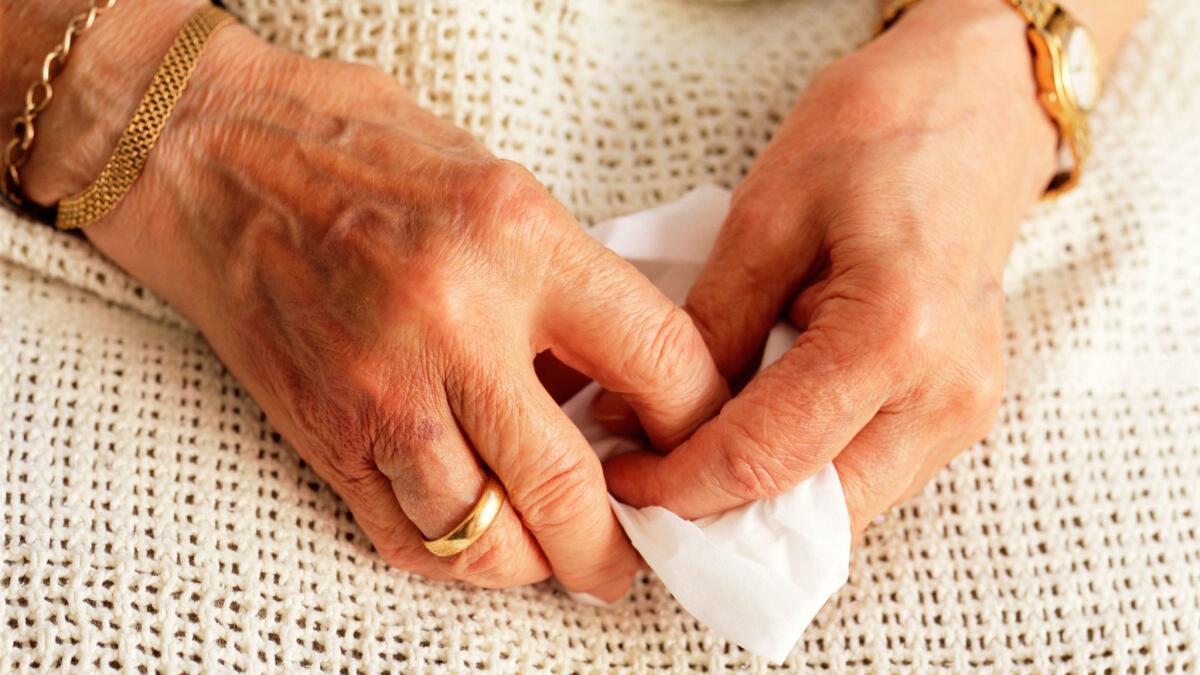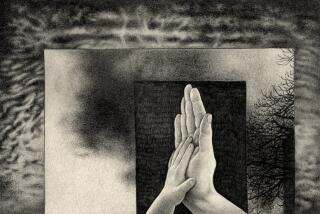Op-Ed: My mom’s dementia has stripped her of all but her least-endearing personality trait: Worry

My mom’s father drowned when he was 29 and my mom was 3, so she knows that people you love can go away and never come back. Maybe that’s why she does not see her fears as irrational.
Before dementia, my sweet 90-year-old mama taught elementary school, sang in a Yiddish chorus, told great stories, had lots of friends, entertained often and with ease, and did volunteer work. Her one aggravating quality was the watchful worrier that lurked within, ready to explode into full, undistractable panic at any moment.
Her field of worry was specific. The subjects were my father, my brother, me, and later my kids. And her worry focused on exactly two things: our health and safety. She wasn’t concerned with our happiness; she didn’t obsess about our social, philosophical or emotional well-being. Nor did she worry about our careers, finances, and relationships. It was health and safety, period.
And I don’t mean she worried if I hadn’t checked in since leaving six weeks earlier to climb Mt. Everest, barefoot, alone, and on crack, with a fever. I mean she worried if she called my house twice and there was no answer.
The last reverberation of her personality is the one trait that brought her and those she loved the most unhappiness.
I live across the country, and she couldn’t hop in the car and race over to see if I’d hit my head and was bleeding to death in the bathtub. So she’d call my friends or neighbors or co-workers whose phone numbers she’d squirreled away for just such an occasion. She’d beg them to mount a search, or at least break in to my apartment. If you were called upon in this way, you never forgot it. Ever.
And we, her beloved victims, who caused and yielded to her worry, sometimes accommodated it generously and sympathetically but usually resentfully.
I became a sneak, telling her I was at work instead of sailing, or taking the bus instead of hitchhiking or riding my boyfriend’s motorcycle. My brother became a ball of rage. My dad, who had the shortest leash of all, just wanted the rest of us to call in often so he could live in peace.
We begged my mom to try anti-anxiety meds, but I think she was afraid to be cured. She believed her worries prevented bad things from happening and kept us all safe. It was like a painful form of prayer she felt duty-bound to perform. Worry to her was not a byproduct or symptom of her love, it was love. So she endured it. When my daughter was diagnosed with cancer, my mom’s reaction was, “I didn’t worry about that!” As if her omission were to blame.
Once our safety had been established, my mom always apologized for hunting us down. But she never promised not to act on her fears the next time she felt alarmed by our absences. And by absence, it’s important to note that she would habitually call out to my dad if he’d been in the bathroom and quiet for too long. Eventually, my dad did fall over dead in the bathroom. By then my mom’s dementia had carried her beyond noting the irony.
And now that she has forgotten so much and lost so many parts of herself — her charm, her humor, her musicality and her ability to befriend — you’d think it only fair she’d finally be rid of her anxiety. But no. The last reverberation of her personality is the one trait that brought her and those she loved the most unhappiness. Like a cruel joke, she has been whittled down to her core, and her core is worry.
We talk on the phone daily. Our conversation is always the same.
“Are you all right?”
“Yes, Mama. I’m fine.”
“And the kids? Are they all right?”
“They are.”
“And have you spoken to your brother?”
I’m a garden-variety worrier; I worry about what will become of my kids in these uncertain times. I worry that my husband and I will outlive our money. I worry that my hair is thinning and that I forgot the word pomegranate for several hours yesterday. But I don’t have my mother’s worry gene, and for that I’ve been enormously grateful.
But like a movie monster rising from the ashes of my mom’s anxiety, I now see my daughter spreading her own wings of worry. She assumes I’ve died in a fiery crash when I’m late getting home. She’s sure her father is on his last legs when his sciatica makes him wince. Of all my mom’s qualities that I’d love to see blossom in the next generation, being a stressed-out worry freak is not one.
I beg my daughter to resist the madness. But I recognize her reaction: She doesn’t dare. Who knows what evil will befall her beloveds if she abandons her worry post?
Amy Koss is the author of “Side Effects” and many other books for teens.
Follow the Opinion section on Twitter @latimesopinionand Facebook
More to Read
A cure for the common opinion
Get thought-provoking perspectives with our weekly newsletter.
You may occasionally receive promotional content from the Los Angeles Times.










